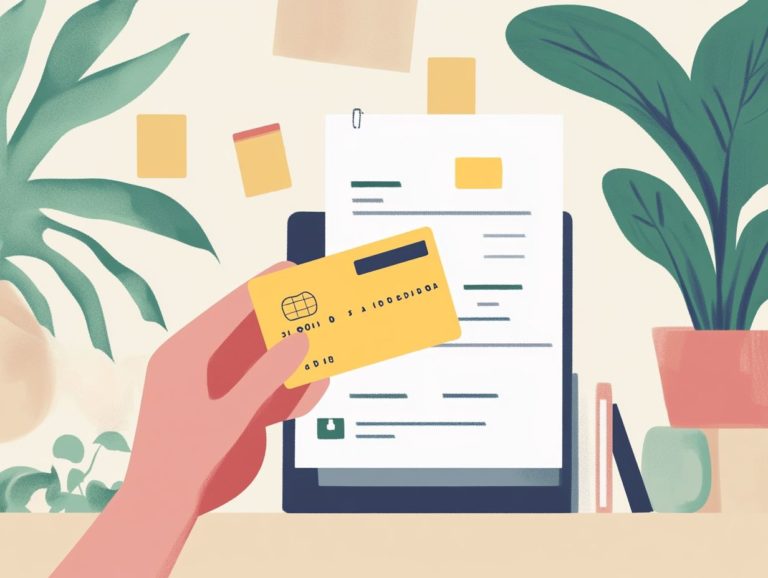Understanding Credit Card Billing Cycles
Navigating the world of credit cards may seem complex, but grasping your billing cycle is crucial for managing your finances with finesse.
This article delves into the essential components of a credit card billing cycle, including the statement date, payment due date, and the all-important grace period. It also sheds light on how credit card interest is calculated, the various types of rates you might encounter, and effective strategies for managing your payments.
It also highlights common pitfalls you should avoid, empowering you to maximize your credit experience and make informed financial decisions.
Contents
Key Takeaways:
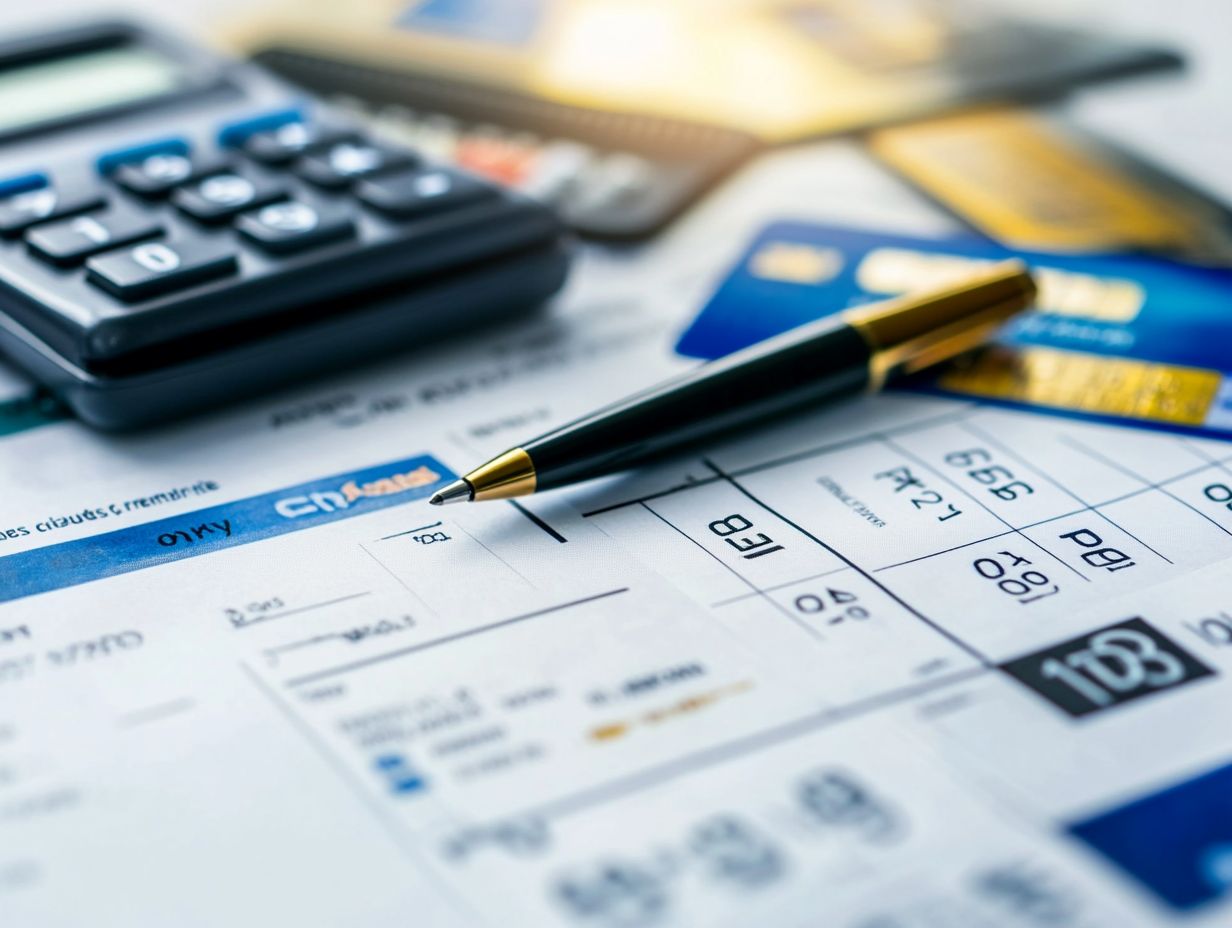
- Understanding credit card billing cycles is crucial for managing your credit card effectively and avoiding costly mistakes.
- The statement date, payment due date, and grace period are important components of a credit card billing cycle that impact your credit score and interest charges.
- To manage your credit card billing cycle, it’s important to make payments on time, stay within your credit limit, and use the grace period wisely.
What is a Billing Cycle?
A billing cycle is a specific timeframe established by your card issuer, during which all your credit card transactions, payments, and interest charges are calculated, ultimately leading to a billing statement that shows your statement balance. Typically lasting around 30 days, this period is essential for managing your credit card payments and grasping various features, such as the grace period and payment due date.
By staying attentive to your billing cycle, you can enhance your credit score and maintain optimal credit utilization. This helps you budget effectively for your bills.
The importance of the billing cycle goes beyond being just a timeframe; it is crucial in determining when your payments are due and what the minimum payment requirements are. By understanding this cycle, you can plan your finances more effectively, ensuring you re aware of upcoming obligations and can dodge those pesky late fees that could hurt your credit score.
By reviewing the transaction summaries provided at the end of each cycle, you can track your spending patterns, empowering you to make informed decisions about future purchases and cultivate a healthier financial lifestyle.
Components of a Credit Card Billing Cycle
The components of a credit card billing cycle include several crucial elements: the statement date, payment due date, and grace period. Each plays a vital role in managing your finances. They help develop effective budgeting strategies.
Understanding these factors can empower you to make informed decisions and optimize your financial well-being.
Statement Date
The statement date is the day when your credit card issuer creates your monthly billing statement, summarizing all your account activity for that billing cycle. This date is crucial, as it marks the start of the period during which all your transactions are recorded. It’s essential for managing your financial health.
Understanding your statement date allows you to anticipate when payments are due, enabling better budgeting and cash flow management. A solid grasp of this timing can help you avoid late payment fees and maintain a healthy credit score, as missed due dates often lead to unnecessary penalties.
Being aware of how the statement date affects your billing cycle arms you with the knowledge to read and understand your billing statements, ultimately making your financial planning more effective and less stressful.
Payment Due Date
The payment due date is your essential deadline for making at least the minimum required payment on your credit card. Missing this date can lead to late fees and additional interest charges that can quickly add up.
Knowing this date is essential to avoid extra costs and protect your credit score. When payments are not made on time, it can result in negative reporting, which could hinder your future borrowing opportunities.
If you consistently overlook these deadlines, you may find yourself caught in a cycle of accumulating fees, making it challenging to break free from debt. To counter this issue, consider setting up payment reminders or notifications that give you a heads-up. This will help you stay organized with your financial commitments and maintain a solid credit history.
Start tracking your billing cycles today to take charge of your credit!
Grace Period
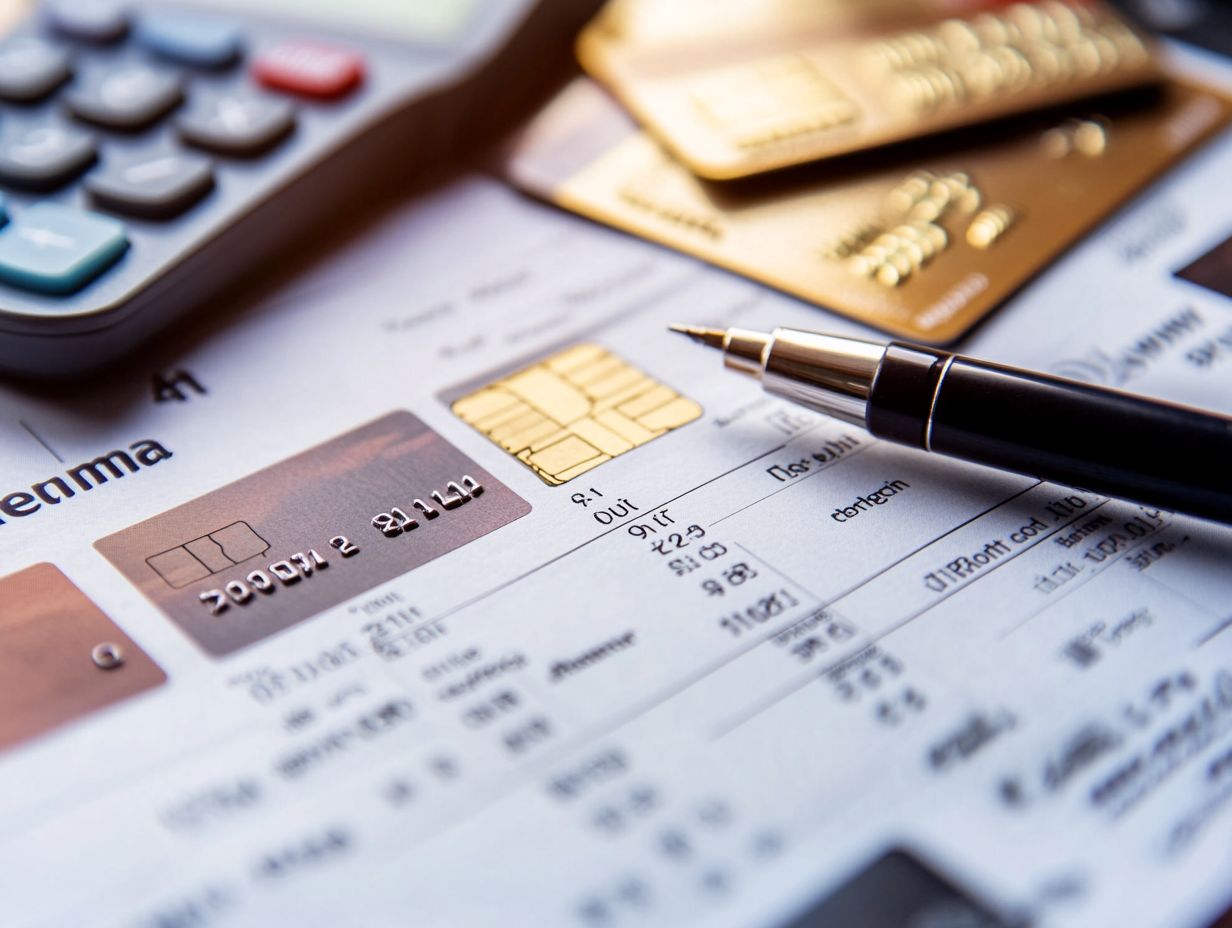
The grace period serves as a valuable timeframe that allows you to pay your statement balance in full without racking up any interest charges assuming you’ve been making your previous payments on time.
This essential feature gives you the power to manage your finances more effectively. It creates a buffer between the statement date and the payment due date. By capitalizing on this grace period, you can not only sidestep unnecessary interest fees but also refine your budgeting strategies, aligning your payments with your cash flow.
It’s especially advantageous if you’re looking to maintain lower credit utilization ratios, as making timely payments prevents revolving debt from negatively impacting your credit score. Ultimately, grasping and leveraging the grace period can lead to more informed financial decisions and contribute to a healthier credit profile.
How Credit Card Interest is Calculated
Understanding the intricacies of credit card interest calculation is essential for you as a cardholder aiming to manage your finances with precision. This process usually revolves around the Annual Percentage Rate (APR), which is the yearly cost of borrowing money on your credit card, shaped by both the billing cycle and your credit utilization rate.
Being aware of these factors allows you to make informed decisions that can enhance your financial well-being.
Understanding APR
The APR varies depending on your creditworthiness. Grasping the APR is vital for anyone navigating the complexities of credit card payments, as it directly impacts how much you ll ultimately pay over time.
If you don t pay off your full balance each month, the interest that accumulates can dramatically increase your overall debt. This makes timely payments essential for maintaining a positive payment history.
Your payment history significantly affects your credit score, which reflects your reliability in managing debt. A higher APR not only signifies greater costs but also serves as an indicator of your risk profile, potentially influencing your future credit opportunities.
Different Types of Interest Rates
Credit cards commonly come with various types of interest rates, including fixed and variable rates that can significantly influence how much interest you end up paying over time during your billing cycles.
Knowing these differences is key to taking control of your finances! A fixed interest rate remains steady throughout the life of your card, offering predictability and simplifying your budgeting process.
On the other hand, a variable interest rate can fluctuate with market conditions, potentially leading to unexpected increases in your monthly payments. This unpredictability can complicate your financial planning, making it crucial to keep a close eye on any changes.
The choice between these rates can impact how long it takes to pay off your balances, ultimately affecting your overall credit card costs and financial stability.
Managing Your Credit Card Billing Cycle
Effectively managing your credit card billing cycle requires the implementation of strategic payment methods, a firm grasp of budgeting techniques, and the savvy use of the grace period. This approach allows you to maintain an optimal credit utilization ratio, ensuring your financial health remains robust.
Take charge of your credit card usage today for a brighter financial future!
Payment Strategies
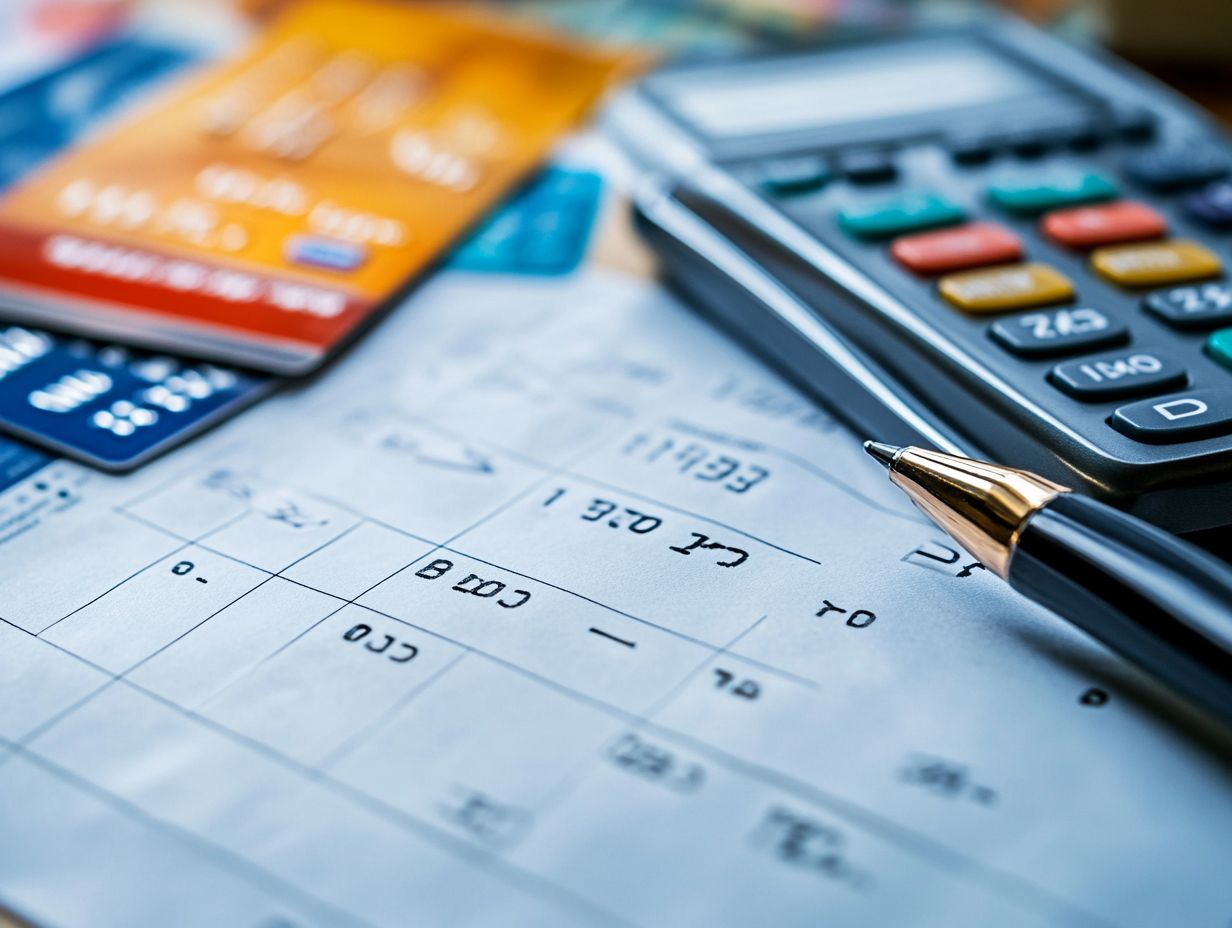
To successfully navigate credit card billing cycles, it s essential to adopt effective payment strategies. Consider making more than just the minimum payment. Structure your payments around your budgeting plans.
For example, you might benefit from bi-weekly payments. This approach helps reduce your principal balance quickly and minimizes interest accumulation over time. Alternatively, paying off your full balance each month can significantly enhance your credit score by keeping your utilization ratios low.
These strategic moves will positively impact your credit score and contribute to your overall financial health. They foster responsible spending habits and alleviate debt-related stress. Regularly review and adjust these strategies to maintain peace of mind and greater financial stability.
Utilizing the Grace Period
Using the grace period effectively empowers you as a credit cardholder to manage your finances better. It allows purchases without incurring interest charges, provided you make payments on time.
This financial buffer gives you the flexibility to plan your budget efficiently. Align your spending with your payment schedules. By taking full advantage of this timeframe, you can avoid unintentional late payments that could harm your credit score. Cultivating timely payment habits promotes good budgeting practices and strengthens your credit history.
Understanding and wisely using the grace period can lead to enhanced financial health and improved creditworthiness over time.
Common Mistakes to Avoid
Being aware of common pitfalls like late payments and maxing out credit limits is essential for you as a credit cardholder who aims to safeguard your credit score and cultivate sound financial habits.
Late Payments
Late payments occur when you miss your minimum payment by the due date. This can seriously affect your payment history and your credit score.
Missing payments can lead to late fees ranging from $25 to $50. This slip-up can also drop your credit score by 30 to 100 points, making it harder to secure loans or obtain better interest rates.
Here s how you can stay ahead and protect your credit:
- Set up automatic payments.
- Maintain a budgeting system.
- Utilize financial management apps to track due dates.
By planning ahead and staying vigilant, you can protect your finances and maintain your creditworthiness.
Maxing Out Credit Limits
Maxing out your credit limits happens when you use your entire credit line. This can seriously hurt your credit utilization ratio, affecting your credit score.
When this occurs, it sends a red flag to lenders, suggesting you might be financially overextended. This could result in higher interest rates on future loans and make it challenging to secure credit altogether. A high utilization ratio anything over 30% can adversely impact your financial health. It’s crucial to manage your credit responsibly.
To mitigate risks, aim to keep your utilization below that threshold. You can do this by:
- spreading your expenses across multiple cards
- consistently paying down your balances
Regularly monitoring your statements and setting budgets can help you maintain a robust credit profile.
Frequently Asked Questions
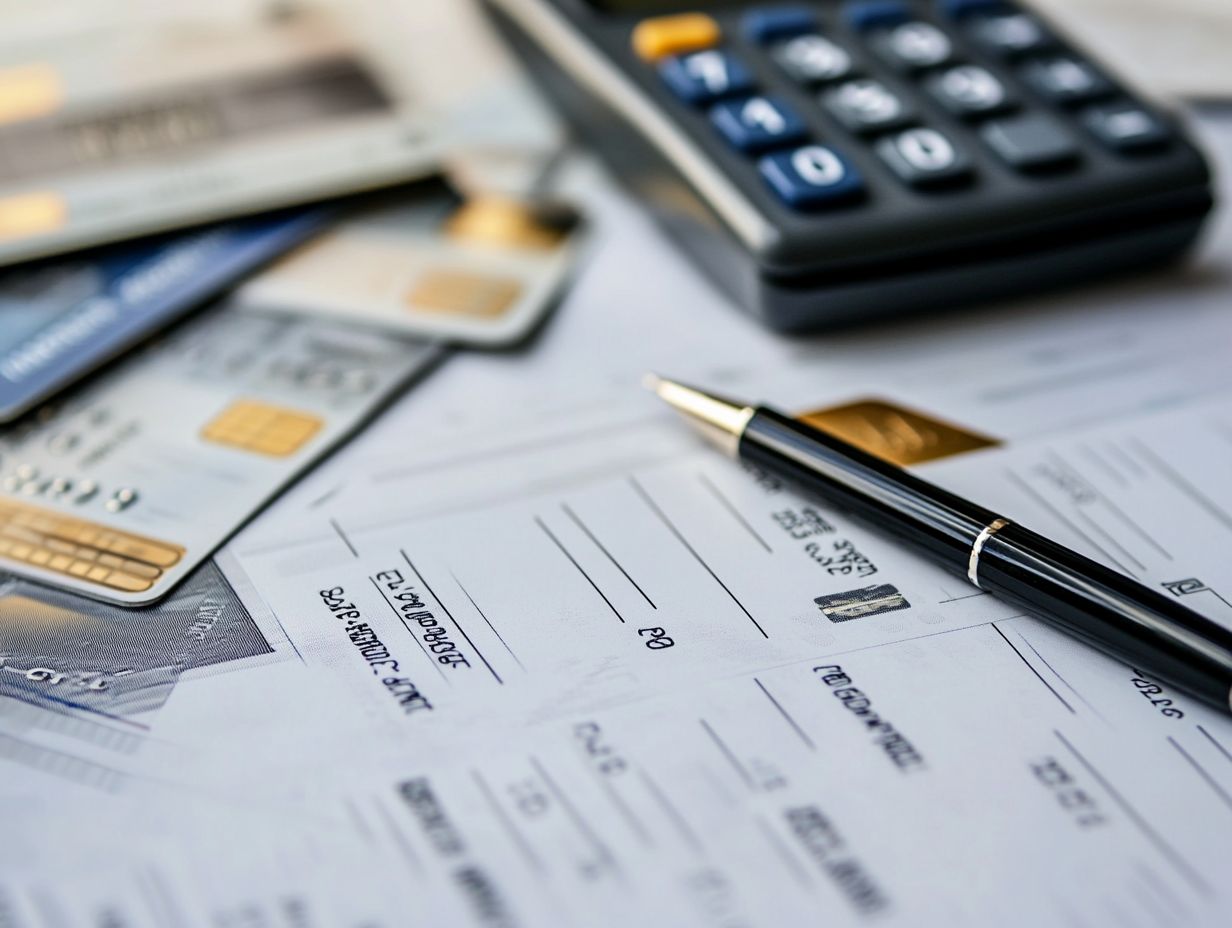
What is a credit card billing cycle?
A credit card billing cycle is the period during which your credit card activity is recorded and billed by your credit card company. Understanding credit card payment due dates is important, as this typically lasts around 30 days, but it can vary depending on the issuer.
When does a billing cycle start and end?
Your billing cycle starts and ends on dates set by your credit card company. It might begin on the first day of the month or on a specific day each month.
What is the purpose of a billing cycle?
A billing cycle helps credit card companies keep track of your activity. This tracking allows them to create accurate statements and calculate the amount you owe.
How do I know when my billing cycle ends?
You can find the end date on your monthly credit card statement. Look for the “Billing Cycle” section; it usually lists both the start and end dates.
What happens if I make a payment after the end of my billing cycle?
Payments made after the cycle ends are applied to your next billing cycle. You might still incur interest or fees for the current cycle, even if you pay late.
Can I change my billing cycle dates?
Generally, you cannot change the billing cycle dates. However, you can reach out to your credit card company for assistance. Be aware that changes might affect your due date.



